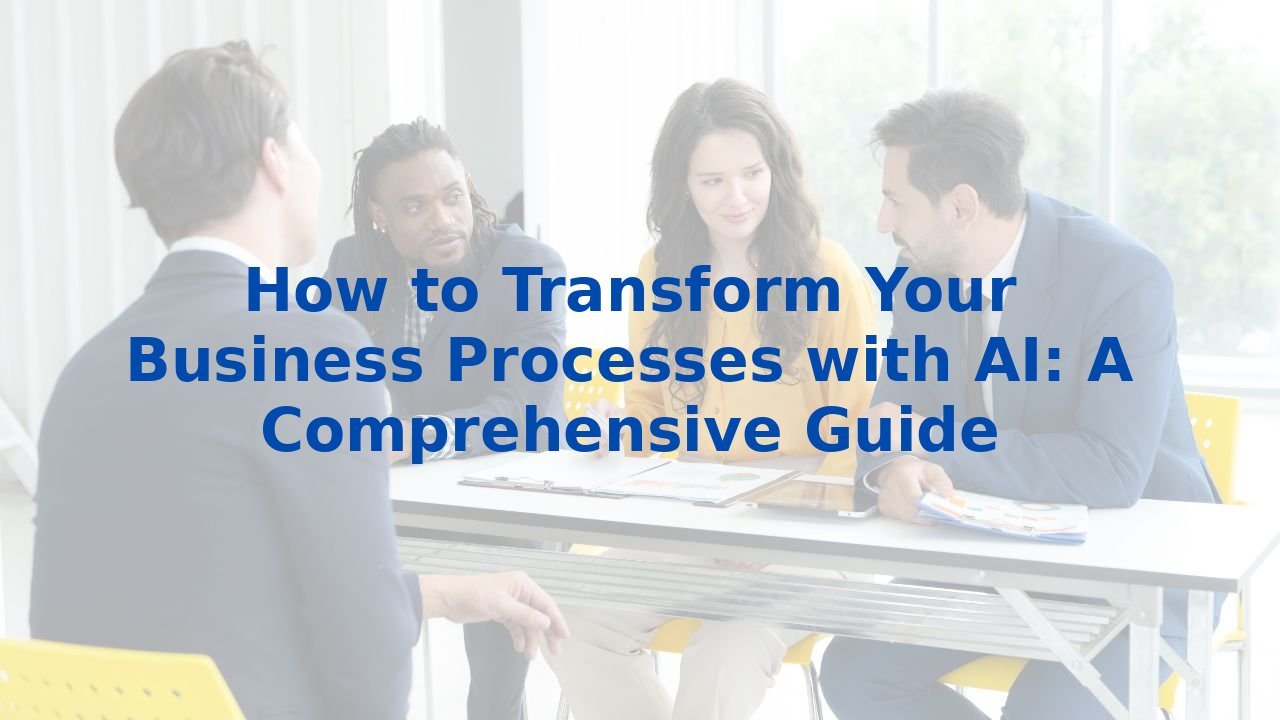How To Transform Your Business Processes with AI: A Comprehensive Guide
How To Transform Your Business Processes with AI: A Comprehensive Guide
Introduction
In the ever-evolving landscape of modern business, Artificial Intelligence (AI) has emerged as a transformative force driving organizations to new heights. As the capabilities of AI continue to expand, companies are discovering innovative ways to enhance their processes, ultimately leading to increased efficiency and streamlined operations. This guide delves into the various business processes that AI can revolutionize and emphasizes the importance of preparing your workforce to harness this powerful technology.
Enhancing Business Processes with AI
Content Creation and Management
In a world where content reigns supreme, AI tools are revolutionizing how we generate and manage information. From crafting engaging articles to creating dynamic social media posts, AI accelerates the content creation process without sacrificing quality. These systems analyze popular trends and contextual information, delivering content that resonates with the target audience swiftly and effectively.
This means less time spent on brainstorming and drafting, allowing marketing and editorial teams to focus on strategies that drive engagement and brand loyalty. By incorporating AI-driven content solutions, organizations not only save resources but also elevate their content strategy significantly.
Customer Service and Support
The role of customer service is being redefined through AI-powered chatbots and virtual assistants. These digital agents can operate around the clock, providing immediate responses to customer inquiries. This unprecedented accessibility not only enhances the customer experience but also alleviates the burden on human support teams, allowing them to concentrate on more complex issues that require a personal touch.
Moreover, advanced AI systems can analyze customer interactions to pinpoint recurring issues and suggest areas for improvement. This analytical prowess leads to a proactive approach in addressing customer needs, ultimately fostering deeper relationships and loyalty.
Data Analysis and Insights
The volume of data generated daily is staggering, and extracting actionable insights can be overwhelming. Here, AI demonstrates its strength by processing vast datasets with astonishing speed. These algorithms uncover trends and predictions that human analysts might overlook, thereby empowering businesses with informed decision-making capabilities.
Consider the impact in sectors such as finance or healthcare, where predictive analytics can identify market patterns or patient outcomes. Harnessing AI for data analysis transforms raw information into strategic insights, enabling organizations to stay ahead of the curve.
Automation and Workflow Optimization
Repetitive and mundane tasks can drain resources and stifle creativity. AI steps in as a game changer by automating these processes—be it in manufacturing lines, administrative duties, or logistical operations. This not only frees up human talent for high-value tasks but also enhances accuracy and reduces errors in execution.
AI-driven workflow optimization tools streamline operations, ensuring that each cog in the organizational machine runs smoothly and efficiently.
Benefits of AI Integration
- Increased Efficiency: By automating essential tasks, AI minimizes the risk of human error, leading to faster processing times and higher productivity levels.
- Improved Accuracy: AI systems excel at performing repetitive tasks with precision, ensuring consistent quality in output.
- Enhanced Customer Experience: Personalized AI-driven interactions significantly enhance customer satisfaction, fostering loyalty.
- Cost Savings: The reduced reliance on manual labor translates to substantial savings on operational costs.
The Importance of Training Employees for AI
While adopting AI technologies can be a significant leap forward, equipping your workforce to engage with these innovations is equally vital. Employee training serves multiple pivotal roles:
Understanding AI Capabilities
For AI tools to be used effectively, employees must grasp their strengths and limitations. This knowledge includes learning how to formulate effective prompts and assess AI-generated outputs for relevance and accuracy.
Ethical Use of AI
The potential of AI brings ethical considerations regarding data privacy, ownership, and biases. Educating your employees helps ensure responsible use, cultivating an environment of trust and accountability.
Integration and Collaboration
AI should be seen as a collaborative partner. Training helps staff learn how to incorporate AI tools seamlessly into daily operations, enabling enhanced productivity that aligns with the organization's vision and goals.
Continuous Learning
The AI landscape is dynamic, and organizations must adapt to thrive. Continuous learning ensures that teams stay ahead of technological developments, maintaining a competitive edge that keeps the organization relevant in an increasingly sophisticated marketplace.
Conclusion
Transforming business processes through AI integration presents organizations with unparalleled opportunities to boost efficiency, enhance accuracy, and enrich customer experiences. However, training your employees to effectively engage with this technology is crucial for realizing its full potential. By investing in workforce development, businesses position themselves to not only adapt to the changing landscape but also lead in innovation and excellence.
For further insights into the intersection of AI and workforce training, consider exploring additional resources that discuss how organizations can equip their entire workforce with essential AI skills. Together, let’s embrace the potential of AI and usher in a new era of efficiency and creativity!



